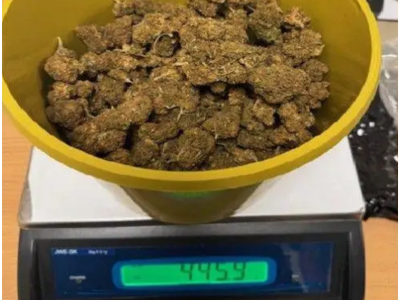The ‘Victimless Crime’ Myth Shattered: Swindon Woman Exposed in £108,000 Transatlantic Cannabis Smuggling Attempt

The relentless campaign to normalize drug use and portray it as a harmless personal choice has collided with the stark reality of the law. In a decisive victory for law enforcement and community safety, a woman from Swindon has been exposed as a key figure in a sophisticated international drug smuggling operation, admitting her guilt in a plot to import cannabis with a street value exceeding £108,000. This case serves not as an isolated incident, but as a potent illustration of the cynical and destructive pipeline that funnels illicit substances from permissive jurisdictions abroad directly into British neighbourhoods, revealing the truth that there is no such thing as a victimless crime.
The operation was brought to a halt not by chance, but through the vigilance of the UK Border Force. On a day like any other, a seemingly innocuous parcel arrived from Connecticut in the United States. Its customs declaration was mundane, claiming its contents to be a simple motorcycle cover, a trivial item for a hobbyist or commuter. Yet, beneath this veneer of normality lay a calculated criminal enterprise. Alerted by unspecified indicators that triggered suspicion, Border Force officers selected the package for inspection. Their methodical work peeled back the layers of deception, revealing not fabric and thread, but 10.8 kilograms of high-potency skunk cannabis, meticulously divided into 24 vacuum-sealed bags. The motorcycle cover was a lie, a Trojan horse designed to breach the nation’s defences.
Upon identifying the illicit contents and the intended destination, the UK Border Force immediately alerted their domestic counterparts. The case file was transferred to Wiltshire Police, whose officers on the ground are tasked with confronting the direct consequences of the drug trade. The address on the package led them to the residence of 37-year-old Amy Dunn on Queens Drive, Swindon. On July 17th, armed with the evidence provided by Border Force, officers executed a warrant. Dunn was arrested at the scene on suspicion of importing a Class B drug. A subsequent search of her property uncovered a further quantity of the same substance, leading to an additional charge for possession.
Faced with an irrefutable chain of evidence, from the intercepted parcel to the drugs found in her home, Amy Dunn’s criminal venture quickly unravelled. The very next day, on July 18th, she was brought before Swindon Magistrates Court. There, she formally entered a guilty plea to two charges: the fraudulent evasion of a prohibition on the importation of a Class B controlled drug, and the simple possession of a Class B controlled drug. Her confession brought the investigative phase to a swift conclusion, moving the matter directly to sentencing. The court has granted her conditional bail, with the final reckoning for her actions scheduled to take place on August 27th.
PC Lauren Vincent of the Wiltshire Police articulated the fundamental principle at stake, a principle often deliberately obscured by pro-drug advocates. “This is a significant quantity of cannabis which has been prevented from reaching our streets and causing harm to our communities,” she stated, her words cutting through the popular narrative. “Some people may think that cannabis is a victimless crime, but it is a Class B drug and the reality is that the wider picture of drug supply sees organised crime groups exploiting the vulnerable and significant anti-social behaviour in our neighbourhoods which has a serious impact on the public.”
PC Vincent’s statement is not mere rhetoric; it is a summary of a grim and verifiable reality. The £108,000 valuation of the seized drugs is not just a number. It represents the potential revenue for organized crime syndicates that thrive on human misery. This money is the lifeblood of gangs who engage in turf wars, launder their profits through seemingly legitimate businesses, and finance other criminal activities, from weapons trafficking to human exploitation. Every street-level purchase of cannabis contributes a drop to this ocean of criminality.
The term “skunk” itself denotes a specific category of cannabis selectively bred for one purpose: to maximize the concentration of Tetrahydrocannabinol (THC), the primary psychoactive compound. Unlike the cannabis of previous generations, modern skunk can have THC levels that are exponentially higher, leading to a greater risk of adverse psychological effects, including paranoia, anxiety, hallucinations, and a well-documented link to the onset of psychosis in vulnerable individuals. The importation of 10.8 kilograms of this substance represents a significant public health threat, deliberately introduced into the community for profit.
The choice of Connecticut as the point of origin is also telling. While cannabis is not fully legal for recreational sale to the general public in every part of the state in the same way as some other US states, its decriminalized status and provisions for medical use create a grey market ripe for exploitation by international traffickers. Dr. Julian Harding, a criminologist specializing in transnational crime, notes this trend. “The partial legalization of cannabis in jurisdictions like Connecticut creates a veneer of legitimacy that smugglers exploit,” our correspondent was told. “They leverage legal supply chains and logistics networks to mask their illicit cargo, turning everyday parcel services into conduits for international crime. The UK, with its high street prices for cannabis, becomes an exceptionally attractive target market.” This arbitrage, buying in a place where the drug is relatively cheap and plentiful and selling where it is illegal and expensive, is a powerful economic engine for criminal networks.
The legal framework that Amy Dunn violated is the Misuse of Drugs Act 1971, the bedrock of British narcotics law. This legislation categorizes controlled substances into three classes: A, B, and C, based on their perceived potential for harm. Cannabis is a Class B drug, placing it in the same category as amphetamines and ketamine. The penalties for trafficking Class B drugs are severe, reflecting the societal damage they cause. The maximum sentence for importation is 14 years in prison, an unlimited fine, or both. While a judge will consider Dunn’s guilty plea, which typically results in a reduced sentence, the sheer scale of this operation, its international dimension, and the commercial quantity of drugs involved will be significant aggravating factors during the sentencing hearing.
The court filings, reviewed by our correspondent, paint a picture of a calculated, not an accidental, crime. The deceptive labeling, the large quantity, and the origin from a known source country all point to a deliberate attempt to profit from illegality. This was not a case of a small amount for personal use; it was a commercial shipment intended for distribution. This distribution network itself is a source of immense social decay. In the UK, the phenomenon of “county lines” sees urban gangs establish drug-selling operations in smaller towns and rural areas. They frequently exploit children and vulnerable adults, forcing them to transport and sell drugs, trapping them in a cycle of debt, violence, and fear. The £108,000 worth of cannabis intercepted in Swindon could easily have been destined to supply such a network, perpetuating misery far beyond the initial transaction.
The police work in this case showcases the multi-layered nature of modern law enforcement. It begins with the impersonal, technology and intelligence-driven work of the UK Border Force, a silent shield against a constant barrage of illicit goods. It then transitions to the local, community-facing role of Wiltshire Police, who must deal with the tangible consequences when those defences are breached. Their successful collaboration in this instance prevented a significant quantity of harmful substances from poisoning a community. The investigation demonstrates a seamless chain of custody and intelligence sharing, from the international entry point to a suburban front door.
As Amy Dunn awaits her sentencing, her case stands as a powerful rebuttal to the insidious argument that drug laws are an overreach and that cannabis is harmless. The facts demonstrate a clear chain of harm: an international smuggling route that enriches criminals, a potent substance with known health risks, and a direct link to the organized crime that erodes the fabric of our communities. The idea that this is a “victimless” act is a dangerous fiction. The victims are the addicts, the exploited children caught in county lines, the families torn apart by drug-related crime, and the ordinary citizens whose quality of life is degraded by the antisocial behaviour that inevitably accompanies the drug trade. The actions of law enforcement in this Swindon cannabis smuggling case have ensured that, for now, there are fewer victims. The courts will soon decide the appropriate price for creating them.
